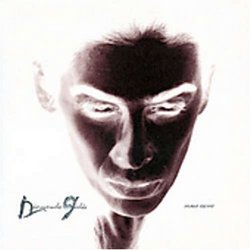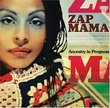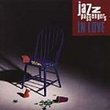| All Artists: Diamanda Galás Title: Vena Cava Members Wishing: 2 Total Copies: 0 Label: Mute U.S. Original Release Date: 9/14/1993 Re-Release Date: 9/7/1993 Genres: Alternative Rock, Special Interest, Pop, Rock Styles: Hardcore & Punk, Indie & Lo-Fi, American Alternative, Experimental Music Number of Discs: 1 SwapaCD Credits: 1 UPCs: 724596145920, 5016025611195, 5099951510657 |
Search - Diamanda Galás :: Vena Cava
 | Diamanda Galás Vena Cava Genres: Alternative Rock, Special Interest, Pop, Rock
|
Larger Image |
CD DetailsSimilarly Requested CDs
|
CD ReviewsDon't say it! Don't do it! Open up! That's a winner... Pamela Scarangello | Middletown, NJ USA | 03/13/2004 (4 out of 5 stars) "Diamanda Galas's 1993 album, "Vena Cava," is taken from the perspective of a raving lunatic locked in solitary confinement. Unlike her past recordings, "Masque of Red Death" and "Plague Mass," this CD puts the singer's vocals on the forefront with very little musical production. Set in a vast and cold emptiness, "Vena Cava" unleashes a slew of sonic spasms from a mind that's wasting away from dementia. Galas herself creates an alarming sense of isolation by battling an illness she can't control. In every track, she is a haggard, old woman who fights a losing battle with insanity and anticipates the permanent calm of death's sleep. On some occasions, Galas mumbles under the covers as if she's groggy from the medication. Her whispers are barely audible, so curious audiences can eavesdrop on her multiple conversations. In other instances, she spews her lines in violent convulsions, randomly mixing cackles and caws with quivering screeches. Feeling her grip on reality slip away, she twitters logical words and phrases in a harsh and obsessive manner. Shocking listeners at every turn, she repeats zeroes and ones in the binary system, multiplies numbers by two, and spits either savage curse words or bedroom prayers. She even awards cash prizes to imaginary game show contestants, kissing the CD with black humor. To further entrap conservatives, Galas escorts them into her own poetic subconsciousness. She dreams about putting a gun to her temple, drunkenly recalls how there is no beer in heaven, and catches broken images of a child's corpse being burned in a garbage bag. These sporadic exorcisms are so graphic that one can somehow envision the damaged parts of the human brain; a mind that can no longer process and store even the simplest bits of information. In-between these heartrending bouts, Galas delivers tearful renditions of "Amazing Grace," Mozart's "Porgi Amor," and "Hush Little Baby." In every song, she's a mourning soprano who awaits the soothing warmth of the sun and the divine light of angels. In the end, of course, Galas demands when death (in the form of a birdie that catches souls) will end her ongoing agony. One must keep in mind that "Vena Cava" is an experimental studio recording. In a way, it lacks the riveting power of 1991's "Plague Mass," which she had performed live in NYC. Still, this album is worth buying because it encapsulates an atmosphere that only Diamanda Galas dared to enter. It's a sterilized hospital room filled with elders sporting needles in their arms and shattered memories in their heads." Nowhere to Hide Pamela Scarangello | 05/26/1999 (5 out of 5 stars) "Diamanda Galas places us at ground zero in a maelstrom of insanity. This album showcases her technical virtuosity, both with her voice (speaking, singing, howling and doing uncategorizable things) and with the multilayer synthesizer effects that punctuate the fragmented narrative. Amazingly enough, the entire hour-long work is a seamless live performance, which is a testament to her stamina. Experiencing the album requires stamina as well; I confess that it took me several listens before I could handle the entire piece at one sitting, and that's not saying how bad it is, that's saying how *good* it is. When the listener finally reaches the end, it's like being cleansed and reborn. In the face of the full fury of Ms. Galas, controversies-of-the-week like Marilyn Manson blow away like the cardboard clowns they are. Need I add that this album is not for the easily disturbed?" Truly harrowing! DAC Crowell | 06/16/2000 (5 out of 5 stars) "This album by vocal experimentalist Diamanda Galas is a nerve-wracking and harrowing exploration of the human mind...viewed from the inside, so to speak...in the throes of insanity and AIDS dementia. And as such, this is a very unpleasant work...but it succeeds admirably in communicating the unpleasantness of its subject, even succeeding to the point that the listener is made exceedingly uncomfortable with the sonic goings-on. Galas here returns to the methods of her early work, with voice accompanied by complex and constantly-shifting processing and shifts in sonic perspective that are calculated to bewilder and disorient. This is also a subject that Galas likely has more than a little insight on, as she lost her brother to AIDS in circumstances which I have read placed him in the state that she documents in this work. In short, if you want pleasant, 'nice' vocal material, go buy a Charlotte Church CD. This ain't it. But if you want a powerful, brutally-stark, and intense work that both showcases one of the most amazing voices in New Music _and_ gives voice to a horrific plight, this is something you should pick up."
|

 Track Listings (8) - Disc #1
Track Listings (8) - Disc #1








